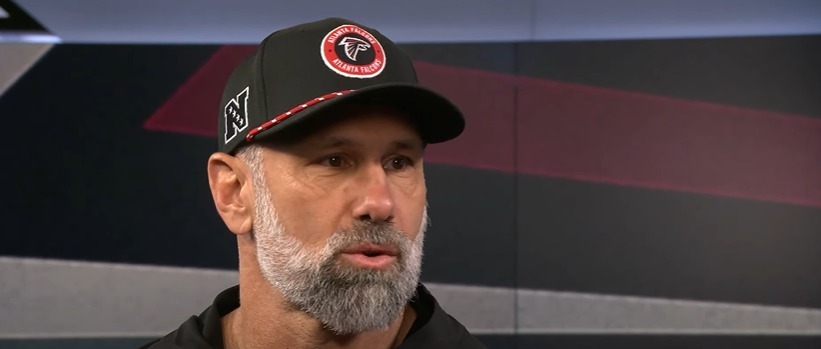Like a well-coached defense, Jeff Ulbrich’s career has been built on accuracy, flexibility, and quiet steadiness. He started out as a tough linebacker but has now developed into a highly successful coordinator, gaining respect from his peers and money. Ulbrich’s estimated net worth as of 2025 is $10 million, a sum that was gradually built over decades of assiduous work and astute decision-making rather than appearing abruptly. Following a recent NFL fine of $100,000 for a creative draft-day prank incorporating his son and top candidate Shedeur Sanders, that financial situation came into sharp relief. Even though the incident generated some laughter and some media coverage, Ulbrich’s upward trajectory remained mostly unaffected.
Ulbrich made it very evident that trust is a two-way street by staying on as defensive coordinator for the Atlanta Falcons despite the team being fined a total of $250,000. Ulbrich has stayed a constant in Atlanta’s football blueprint, whereas many coaches move throughout the league. His retention is especially significant in a setting where tenure frequently ends with a losing streak. It implies that he represents continuity rather than just strategy. Even though it isn’t always shown on an employment sheet, that kind of value is very difficult to replace.
| Detail | Figure/Status |
|---|---|
| Estimated Net Worth | $10 million |
| NFL Fine (2025 Draft Prank) | $100,000 |
| Team Fine (Atlanta Falcons) | $250,000 |
| Current Role | Defensive Coordinator, Atlanta Falcons |
| Estimated Annual Salary | $1–2 million |
| Playing Career Highlights | 10 seasons with 49ers, 500+ tackles |
| Coaching Start | Special Teams, Seattle Seahawks |
| Notable College Role | UCLA Linebackers Coach |
| Promotion Timeline | Falcons Assistant HC by 2020 |
Rather than through on-field antics or media appearances, Ulbrich’s reputation was built over the course of ten physically demanding seasons with the San Francisco 49ers, over which he recorded over 500 tackles. He was consistently one of the team’s most dependable players, even though he occasionally wasn’t the most well-known. Throughout his coaching career, he maintained the same level of grounded intensity. His early involvement with the special teams of the Seattle Seahawks gave him the opportunity to gain experience in leadership roles that are often hidden from view. These early experiences gave him the foundation on which to build an incredibly resilient coaching career.

His time at UCLA was very beneficial to him, especially in terms of improving his communication abilities. By coaching younger competitors in college and combining conventional discipline with analytics data, Ulbrich developed the rare skill of bridging generational gaps. That combination of ideas made him incredibly innovative in his approach to talent, especially considering the NFL’s shifting locker room cultures. When the Falcons hired him in 2015, they were expecting more than just a coordinator—they were expecting a culture-builder. By 2020, he was promoted to assistant head coach, a role usually occupied by those training for the top job.
In recent seasons, Ulbrich’s potential for earnings has grown considerably. Industry insiders claim that top coordinators now earn between $1 and $2 million annually, especially when playoff incentives and performance-based bonuses are factored in. Although Ulbrich doesn’t discuss his pay much, it falls within that range. Similar people like Vic Fangio and Dan Quinn have set the bar for coordinators who become head coaches, and Ulbrich follows that path—calmly but deliberately. His pay reflects both an extremely rare level of institutional confidence and his professional accomplishments.
The 2025 NFL Draft is another instance of Ulbrich’s influence in the Falcons’ war room. After choosing two edge rushers in the first round, it was clear that the team was bolstering its defensive identity around Ulbrich’s high-pressure style. That kind of strategic coordination, where coaching vision directly affects draft capital, is difficult to achieve. His fine for his playful part in the Sanders hoax was more of a humorous side story than a scandal, even when it made headlines. It is clear that Atlanta’s leadership views the coordinator as a vital part of their long-term strategy rather than a temporary solution.
Ulbrich’s rise also reflects a broader trend in which former players are reshaping coaching dynamics. Emotional intelligence and technical skill can change the game, as demonstrated by players like Mike Vrabel, Dan Campbell, and DeMeco Ryans. Ulbrich is a good illustration of this shift. Although he doesn’t have the same influence over news conferences as more flamboyant characters, his message resonates deeply with players, a lot of whom credit him with helping them grow. His ability to teach, motivate, and adapt has made him incredibly flexible and, perhaps more importantly, highly reliable.
Even the well-known draft-day hoax revealed Ulbrich’s surprisingly human disposition. The episode subtly conveyed his value for family and sincerity, which are often more appealing in locker rooms than practical language, rather than undermining confidence. For young athletes navigating high-stakes careers, having a coach who finds a balance between authority and empathy may be especially comforting. By fusing discipline with dad-humor, Ulbrich has created a leadership style that is refreshingly genuine.
Ulbrich is expected to rise even higher in the future. Many analysts believe that becoming a head coach is his next natural step, and the time seems right. If he gets such a job, his annual salary could quickly surpass $5 million, and his career wealth could surpass $15 million in a few seasons. Teams are increasingly looking for executive profiles based on relational depth and endurance, and Ulbrich’s resume fits like a fitted suit—subtle, efficient, and surprisingly powerful.
